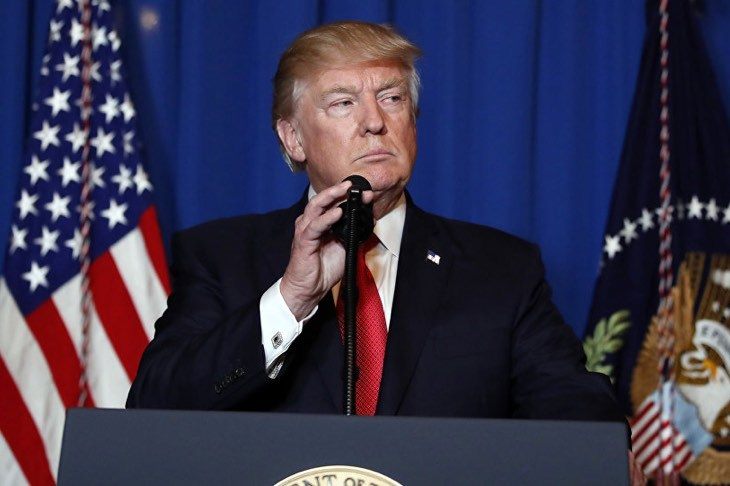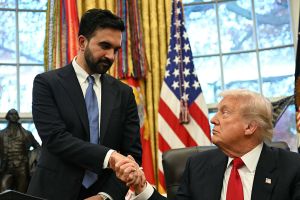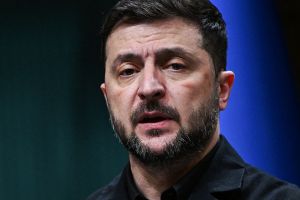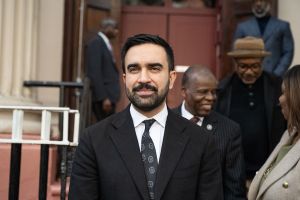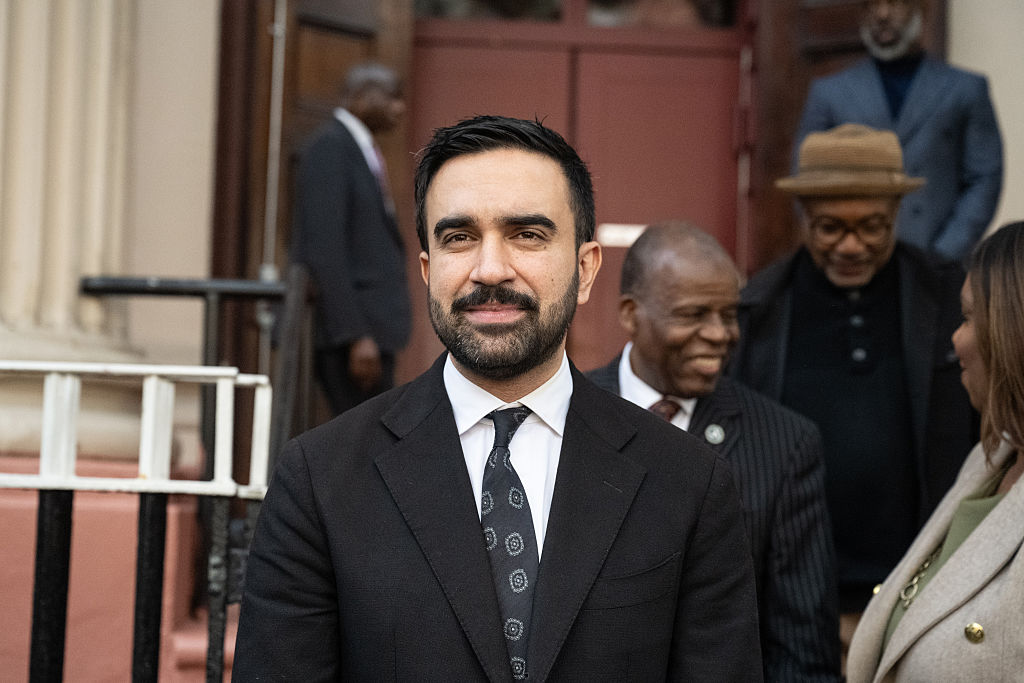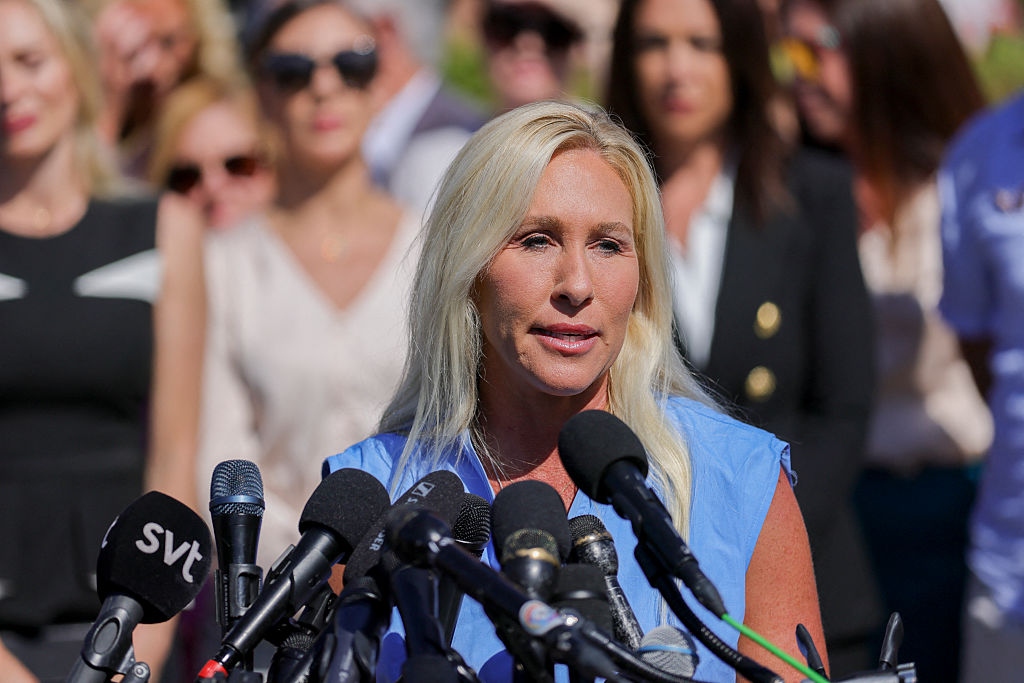finally had something positive to say on Twitter. After nearly a week of dithering, the president made a decision and announced it, to a fair amount of surprise, on national television on Friday night: The United States, in concert with the United Kingdom and France, would launch targeted strikes on Syrian chemical weapons facilities, in response to a heartbreaking attack a week earlier in a Damascus suburb that killed dozens of civilians, including children.
“A perfectly executed strike last night. Thank you to France and the United Kingdom for their wisdom and the power of their fine Military. Could not have had a better result. Mission Accomplished!” Trump tweeted on Saturday morning.
Those last two words gave many pause. Is Trump unable to use his favourite medium without being a little controversial, without needling the Establishment just a bit? Or is the president unaware of one of the worst presidential PR moments of recent history? In May 2003, George W. Bush famously—infamously might be the better word—gave a televised speech from an aircraft carrier that had just returned from the Persian Gulf. Saddam Hussein had been pushed out of power and the president declared the end of major combat operations in Iraq underneath a banner reading “Mission Accomplished.” The image came back to haunt him months later, when an anti-American insurgency started in the country that tied up U.S. forces for years.
After Trump tweeted, former Bush spokesman Ari Fleischer took the opportunity to try to set the record straight about that moment. “It was the crew’s message from start to finish,” he tweeted. “After our advance crew boarded the ship in Hawaii days prior to Bush’s landing on the USS Abraham Lincoln, the Navy crew told us they were returning from the longest deployment of any ship in Naval history. They were proud of what they had done.” And they asked the White House for permission to display a “Mission Accomplished” banner, which remained on the carrier until it returned to its home port in Washington state. “In his remarks, Bush stated the danger was not over and that difficult missions lay ahead, particularly in the Sunni triangle. The nuance of his remarks, however, couldn’t compete with the message of this banner.” Fleischer noted that the press didn’t criticize the pennant at the time. “By the Fall, the shot of Bush with the banner became a symbol of what went wrong.”
Many in the White House must now be hoping those same words don’t return to haunt this president. (And many outside it are certain to be hoping they do.) But though critics are complaining that the White House has no serious strategy on Syria—and despite some mixed messages coming from the administration itself—the mission in this case does seem to have been, quite particularly, specifically defined. What was the mission? “The purpose of our actions tonight is to establish a strong deterrent against the production, spread, and use of chemical weapons,” Donald Trump said in his speech to the nation Friday night. That sounds broad, and it is—but it’s the big-picture talk of a televised address. The three-nation attack hit three specific sites, including a chemical weapons research centre near the Syrian capital of Damascus. Lt. Gen. Kenneth McKenzie, the director of the Joint Chiefs of Staff, told reporters that the strikes “will significantly impact the Syrian regime’s ability to develop, deploy and use chemical weapons in the future.”
True, there were those mixed messages. Donald Trump said, “We are prepared to sustain this response until the Syrian regime stops its use of prohibited chemical agents.” On the other hand, Defense Secretary James Mattis, briefing reporters, was quick to emphasise the response was a “one-time shot.”
It’s the difference between the operational versus the strategic mission. We can’t yet know whether these strikes, which many observers on both sides of the aisle are calling “restrained,” will fulfil their strategic mission. A Pentagon official admitted that Syrian dictator Bashar al-Assad has a “residual” chemical weapons capability, even after the strikes. He—along with his patrons, the governments of Russia and Iran—will have to decide whether controlling his population is worth the risk of further American-led airstrikes.
But operationally, the mission seems to have been a striking success (though that warning of “residual” capability is a bit worrisome). The bombs hit their targets. The anti-aircraft missiles Russia provided—and had warned the United States about—had no virtually no effect. And, contrary to the fearmongers, the attack didn’t lead to the start of World War III. Russia has done nothing to retaliate so far except seek United Nations condemnation of the move—and that failed. Donald Trump in one night delivered a real rebuke to Vladimir Putin, and Russia’s almost comical response—the country that annexed Crimea is decrying the violation of “international norms”—put it in a weaker position than months of sanctions have.



